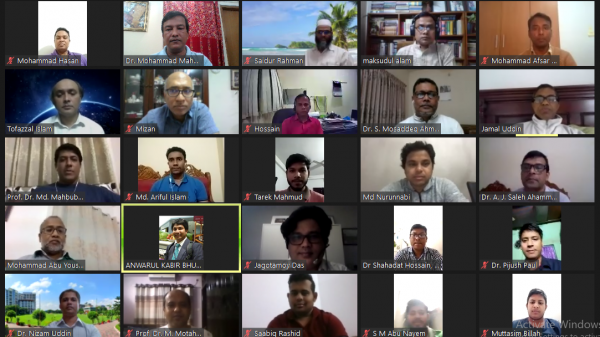It is easy to cure a disease if it is identified at its early stage. So inventing new sophisticated technologies for diagnosis is very important. Nanotechnology is widely used in modern medicine to diagnose and treat diseases, administer medicines to patients, and even to manufacture medicines. Extensive researches on how nanotechnology can be used more effectively in medicine are being conducted worldwide. Nanoscientists discussed elaborately on the above mentioned issues in a webinar organized by Bangladesh Nano Society on Saturday evening (November 21, 2020).
Dr. Md. Nurunnabi, an Assistant Professor of Pharmaceutics at the University of Texas at El Paso, USA, presented a keynote on “Potential of 2D Nanomaterials for Diagnostic and Therapeutic Applications”. He discussed in detail on how 2D nanomaterial, graphene, can be used in diagnosis and treatment of diseases. Dr. Jagotamoy Das, a senior research associate at the Department of Pharmaceutical Sciences, University of Toronto, Canada, added his opinion on the topic presented. He focused on the potential applications and efficiency of two-dimensional nanomaterials in various ultramodern diagnostic tools such as cancer biomarkers, nanobiosensors etc. Dr. Mohammad Mahbub Rabbani, Associate Professor of Chemistry at American International University-Bangladesh (AIUB) hosted the webinar while Professor Dr. Md. Tofazzal Islam, the founding director of the Institute of Biotechnology and Genetic Engineering at Bangabandhu Sheikh Mujibur Rahman Agricultural University presided over the webinar. Professor Islam discussed on the overall research activities in the area of nanotechnology in Bangladesh. He highlighted the importance of research, various opportunities and scopes of the application of nanotechnology in agriculture, agricultural production, conservation of agricultural products and foodstuffs, marketing, and the possibility of using nanotechnology in plant diseases control. At the end of the presentation and discussion, Dr. A. J. Saleh Ahmed, Associate Professor, Department of Chemistry at Jagannath University conducted the question and answer session. Huge number of students, faculties and researchers from home and abroad participated in the webinar. Emphasizing the importance of nanotechnology to meet the Fourth Industrial Revolution, Professor Dr. Al-Naqib Chowdhury of Department of Chemistry at BUET concluded the session with a vote of thanks to the participants. It is noted that Bangladesh Nano Society (BNS) regularly organizes such webinars on different nanotechnology based topics.

